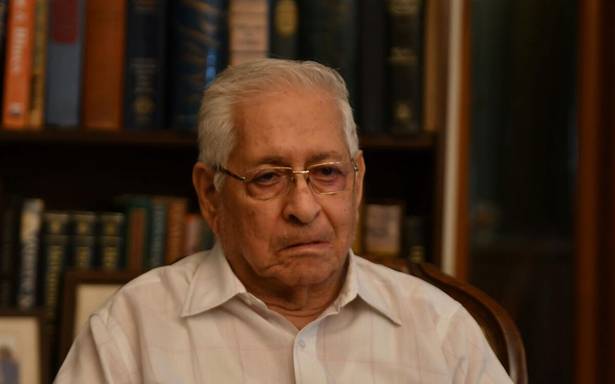Anadi Tewari
Veteran jurist and former Attorney General Soli J Sorabjee, succumbed to COVID-19 this Friday morning, aged 91.
“(1) My neighbour-common wall—Soli Sorabjee-passes away. Went 2max late nite a week ago with covid but per wife, Zena was stable & ok, only fidgety at being alone. Happy 2 get their house fumigated at Zena request. Suddenly, (his) heart stopped the last nite & could not be revived. Long association,” Senior Advocate AM Singhvi shares news of the passing of Soli Sorabjee.
“(2) Sat with #Soli about 1 month ago in his lawn & discussed law, life & politics. had a zest 4info & a view on everything. Speech slurred, frail in body but mindfully alert & memory largely intact. When mobile, till few yrs ago, I would pick or drop him to & from lawyer gatherings,” further tweeted Senior Advocate AM Singhvi.
Born in the year 1930, Soli Sorabjee commenced his legal practice in the year 1953 at the Bombay High Court.
In the year 1971, Soli Sorabjee was designated as the senior advocate by the Supreme Court. From the year 1977 to 1980, he served as the Solicitor General of India. He also became the Attorney General of India, first from 1989-90 and then from 1998 to 2004.
Known for his exceptional legal acumen and association with human rights cases, Sorabjee has been a votary of protection of fundamental rights of the last man standing in the socio-economic hierarchy. He was appointed by the United Nations as a Special Rapporteur for Nigeria in 1997. Following this, Sorabjee joined the United Nations Sub-Commission on Promotion and Protection of Human Rights and was its chairman from 1998 to 2004. He also served as a member of the Permanent Court of Arbitration in The Hague from 2000 to 2006.
In March 2002, Soli Sorabjee was awarded the Padma Vibhushan for his defence of the freedom of expression and the protection of human rights. He was also honoured with the Justice KS Hegde foundation award in April 2006. Sorabjee also worked on the Citizen’s Justice Committee which represented pro bono the 1984 Anti-Sikh riots victims.
Soli Sorabjee was a staunch defender of Fundamental Rights and was involved in many cases for defending these rights particularly the freedom of speech and expression. In light of the same, he had appeared in some of the landmark cases before the Supreme Court like Kesavanada Bharti v. State of Kerala [AIR 1973 SC 1461], Maneka Gandhi v. Union of India [AIR 1978 SC 597], S.R. Bommai v. Union of India [AIR 1994 SC 1918], I.R. Coelho v. State of Tamil Nadu [AIR 2007 SC 861].
Sorabjee’s publications include:
Books: The Law of Press Censorship in India (1976), The Emergency, Censorship and the Press in India 1975-77 (1977), Law and Justice (1994).
Articles: Freedom of Expression and Censorship: Some Aspects of the Indian Experience, Winter 1994 issue of Northern Ireland Legal Quarterly, Freedom of Expression, Commonwealth Law Journal-Bulletin (1994), Obliging Government to Control Itself; Recent Development in Indian Administrative Law, Spring 1994 issue of “Public Law”.
Essays and Monographs: Protection of Human Rights in Emergencies (1988), Equity in the United States and India published in “Constitutionalism and Rights” (1990), The Constitution and the Governor as published in “The Governor, Sage or Saboteur” (1985), Fundamental Rights as published in “Public Law of India” (1979).

